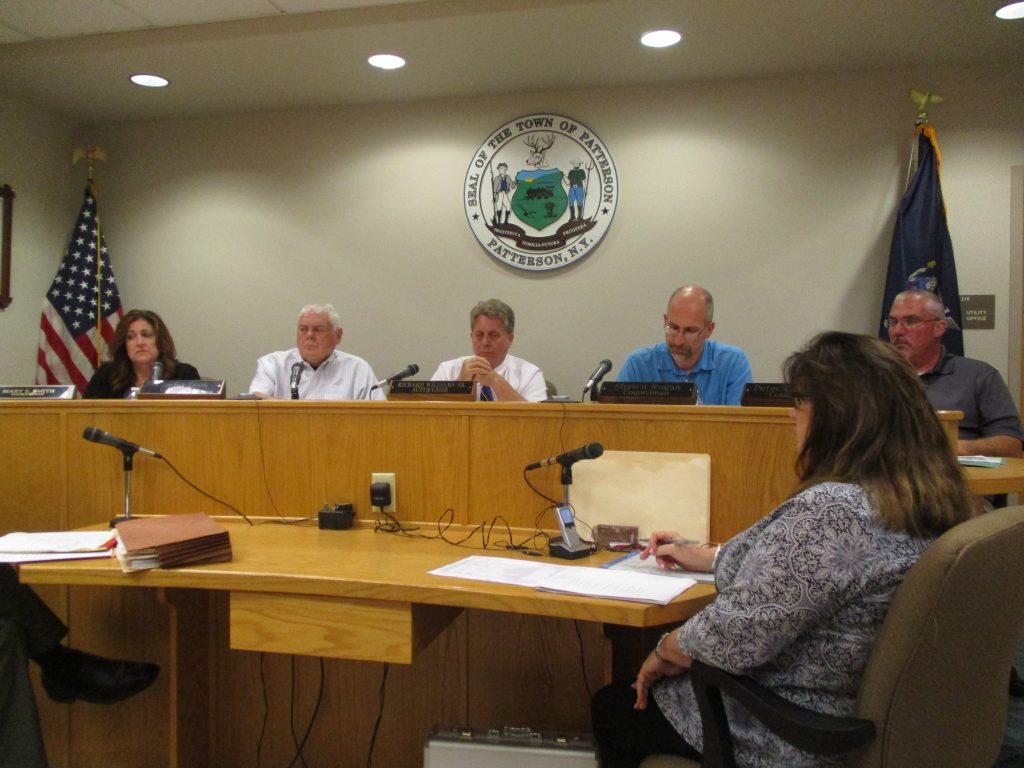Patterson Town Board OKs Recycling Center Cell Tower

By Neal Rentz
In an effort to lure the MTA Police away from a residential site, the Patterson Town Board voted 4-1 on Aug. 22 to enter into a lease of up to 50 years with Wireless Edge to construct a cell tower on the recycling center property.
Even with the new lease there is no guarantee that the MTA will utilize the tower. Supervisor Richard Williams said the MTA wanted all approvals in place by Sept. 1. If the MTA does not agree to use the recycling center cell tower it will have one built on property it owns on Route 164, close to houses in the residential area.
At a meeting the previous week, the Patterson town board indicated that the MTA was likely going to build its cell tower at the embattled Route 164 site, but there was still some hope the recycling center could be chosen instead.
Deputy Supervisor Charles Cook, who had several questions about the lease, voted no.
Jordan Fry, an attorney representing Wireless Edge, outlined terms of the lease. The lease will initially be for 10 years with options for four additional 10 year options to extend the contract, he said
Fry said the MTA said it would not pay for its possible use of the recycling center. The town would receive $1,500 a month from Wireless Edge for the first year, with 2 percent increases for each subsequent year of the lease after a company agrees to utilize the tower, Fry said. Wireless Edge will not begin payments until after it recoups its $500,000 in capital costs or no more than five years after the lease is signed, Fry said. The town would also receive an additional 20 percent of the
rental payments from the second and subsequent users of the tower through payments by Wireless Edge, he said.
In response to a question from Cook, Fry said the tower would be a monopole.
Fry said if the MTA does not submit a formal request to go on the recycling center tower the town would have the option to terminate the lease.
Cook asked if the MTA would agree to come to the recycling center tower. “The town and Wireless Edge have worked very hard to meet the deadlines that the MTA has requested,” Fry replied, adding his client was willing to allow the MTA to not be required to make payments. Fry said his client and the town would continue to lobby the MTA to come to their site.
“I can’t tell you what the MTA’s going to do,” Fry said.
Fry said if the recycling center tower is built it could encourage carriers to use it.
Cook asked if there was a possibility that the town could not receive any revenue for the first five years if no carriers came to the recycling center tower. That would be possible, Fry said. If a carrier came to the tower in the sixth year, the town would start to receive payments from Wireless Edge even if the company had not gotten any previous commercial leases, Fry said.
John Arthur, president and CEO of Wireless Edge, agreed to a request from Williams to reduce the height of the cell tower from the originally proposed 166 feet to 140 feet, if the MTA agreed to the lower height. Williams said the shorter height would reduce the negative visual impact of the tower.
Arthur told Councilwoman Mary Smith that his company would pay to take down the tower when it was no longer needed.
Councilman Shawn Rogan said the recycling center site was preferable to Route 164, but both sites would have negative visual impacts. “This stinks either way,” he said, adding potential revenue the tower would generate was not a consideration in his decision. Williams said 20 houses are located within 1,000 feet of the Route 164 site, while 10 houses would be within 1,500 feet of the Recycling Center property.
Cook said he was concerned the town could wait five years without receiving revenue from Wireless Edge.
County Legislator Ginny Nacerino said, “This whole process was driven by the MTA.” Nacerino said she supported the reduction of the height of the tower to 140 feet and the recycling center site.
Three residents who spoke at last week’s meeting said they opposed the lease with Wireless Edge.
Resident Bruce Major said, “We got a lot of information” on the lease and that was positive, but he still was concerned with the lease that would allow the placement of the tower at the recycling center. The MTA should pay for the use of a cell tower on town property, he said.
Arthur confirmed in response to a question from Major that Wireless Edge was considering another cell tower on the firehouse in town.
Arthur told Major a second tower was needed for coverage for wireless carriers and the two sites would overlap. The firehouse tower would be between approximately 125 to 130 feet in height and there are carriers interested in using the firehouse site, he said. The MTA is not interested in using the firehouse site, he noted.
Resident Margaret Kessman said a cell tower at the recycling center would reduce the value of her property.
Resident Chris DiGiacinto said he opposed the placement of the cell tower near his home because he can see the recycling center from his house. He said he was concerned that the MTA will not provide payments to the town.
“There’s a real possibility the town will not make a dime,” he said.
